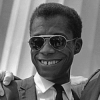James A. Baldwin

James A. Baldwin
James A. "Jim" Baldwinwas an American football player, track athlete, coach of football, basketball, and baseball, and college athletics administrator. He served as the head football coach at Rhode Island State College—now the University of Rhode Island, the University of Maine, Trinity College in Durham, North Carolina—now Duke University, Lehigh University, and Wake Forest University, compiling a career college football record of 41–32–14. Baldwin was also the head basketball coach at the same five schools, amassing a career college basketball...
NationalityAmerican
ProfessionAuthor
Date of Birth2 August 1924
CountryUnited States of America
The trick is to love somebody.... If you love one person, you see everybody else differently.
When human rights are abused on a grand scale, the broth of purity boils and feeds the rebellion of a new order.
She was twenty and had come to realize that, though she had a voice, she wasn't a singer; that to endure and embrace the life of a singer demands a whole lot more than a voice.
It was as though we were a picture, trapped in time: this had been happening for hundreds of years, people sitting in a room, waiting for dinner, and listening to the blues.
One writes out of one thing only-one's own experience,
I think white gay people feel cheated because they were born, in principle, in a society in which they were supposed to be safe. The anomaly of their sexuality puts them in danger, unexpectedly.
All over Harlem, Negro boys and girls are growing into stunted maturity, trying desperately to find a place to stand; and the wonder is not that so many are ruined but that so many survive.
Fonny and I just sat there... while the voices of the congregation rose and rose around us, without mercy... Teddy had the tambourine, and gave the cue to the piano player-I never got to know him: a long dark, evil-looking brother, with hands made for strangling; and with these hands he attacked the keyboard like he was beating the brains out of someone he remembered. No doubt the congregation had their memories, too, and they went to pieces. The church began to rock.
We take our shape, it is true, within and against that cage of reality bequeathed us at our birth; and yet it is precisely through our dependence on this reality that we are most endlessly betrayed.
I am certainly convinced that it is one of the greatest impulses of mankind to arrive at something higher than a natural state.
He may be a very nice man. But I haven't got the time to figure that out. All I know is, he's got a uniform and a gun and I have to relate to him that way. That's the only way to relate to him because one of us may have to die.
I am aware that no man is a villain in his own eyes.
Writing is a political instrument.
At four o'clock in the morning, when everyone is drunk enough, then extraordinary things can happen.